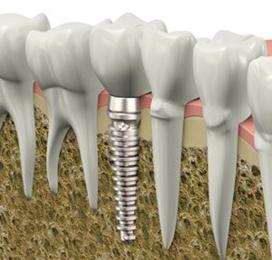 |
|
АкушерствоАнатомияАнестезиологияВакцинопрофилактикаВалеологияВетеринарияГигиенаЗаболеванияИммунологияКардиологияНеврологияНефрологияОнкологияОториноларингологияОфтальмологияПаразитологияПедиатрияПервая помощьПсихиатрияПульмонологияРеанимацияРевматологияСтоматологияТерапияТоксикологияТравматологияУрологияФармакологияФармацевтикаФизиотерапияФтизиатрияХирургияЭндокринологияЭпидемиология |
TEXT 2. MINI DENTAL IMPLANTS VS. TRADITIONAL DENTAL IMPLANTSThere are many different ways of replacing lost or fallen teeth. While a removable denture or a bridge are possible options that you have, none of them are as good as dental implants which is said to be one of the most stable and longstanding treatment options for lost or fallen teeth. Dental implants are fast becoming the treatment of choice for many individuals. In this treatment option, a small screw is fitted into the bone, after cutting the gums to gain access and then, a crown is fitted over the screw. This makes implants as close to real teeth as any replaceable option can be, and gives it an edge over bridge. However, technology and innovation seldom go to sleep, and the new variation in this treatment option in the form of mini dental implants - the smaller and miniature versions of traditional implants - highlight this fact very well. How are Mini Dental Implants Different from Traditional Implants? A normal dental implant, as mentioned above, consists of a titanium screw that is fitted into the jawbone. Most of these dental implants are about four to five millimeters in diameter. However, mini dental implants are those that have a diameter of less than three millimeters. So, how do they manage to be as good as traditional implants despite being nearly two-thirds their size? Well, the secret lies in the fact that these implants are solid from the inside whereas traditional implants are usually hollow in the middle. Hence, these manage to be just as strong as traditional implants. There are many apparent advantages of mini dental implants over traditional implants. One of the most commonly quoted factors that draws the favor of dentists and patients alike is the fact that the cost of mini dental implants is nearly half of traditional implants. Therefore, many patients opt for this kind of implant rather than going in for traditional implants, especially considering the fact that it is very difficult to obtain dental insurance for implants. Another factor that works in favor of mini dental implants is that it is an immediate, one-sitting procedure. Usually, when a traditional implant is placed, the area is incised, bone is drilled, sutures are placed and then there is a waiting period for osseointegration, i.e. some time is given for healing of bone and for it to accept the implant. But when it comes to mini dental implants, this is a single-sitting procedure mainly because it is minimally invasive as compared to its traditional counterpart. This, in turn, can be attributed to the fact that the amount of bone drilled is minimal, and then prosthesis is immediately placed on the implant screw. Despite all the claims of mini dental implants being the same as traditional implants when it comes to strength, one cannot deny the fact that with minimal bone drilling, the ability of the implant to withstand masticatory forces is compromised. Thus, mini implants are usually opted in cases wherein the load expected on the tooth is within a limit, like for front teeth and in cases of overdentures. Since mini dental implants are still a relatively new concept - especially when compared to traditional dental implants, there isn't much data to know of the success rate of this treatment option. However, it has been seen that mini dental implants have a higher success rate when they are used only in those regions where the load is not very high. Though they are yet to gain popularity as compared to traditional implants, as even seasoned implantologists are a bit apprehensive about the success rate of this variation in implants. The debate or rather, the battle of between these dental implants is a never ending one. There are some dentists who have been left embarrassed by the failure of mini dental implants and have had to endure the tirade of their patients for the same, which has made them keep their distance from these implants. On the other hand, some dentists have managed to convince many patients to opt for this cheaper treatment option, and have tasted success with the same. There are many different factors that influence the success of dental implants, and sterilization, technique, patient health, quality of implant are just a few of them. The decision on which of these two tooth replacement options to choose from is to be taken by the dentist and patient jointly. So, it is best to discuss all the pros and cons of both traditional and mini dental implants, so that the patient and dentist both ensure that the best possible option is chosen and executed.
Дата добавления: 2015-02-05 | Просмотры: 1034 | Нарушение авторских прав |
